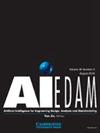inML Kit: empowering the prototyping of ML-enhanced products by involving designers in the ML lifecycle
IF 2.3
3区 工程技术
Q3 COMPUTER SCIENCE, ARTIFICIAL INTELLIGENCE
Ai Edam-Artificial Intelligence for Engineering Design Analysis and Manufacturing
Pub Date : 2022-02-09
DOI:10.1017/S0890060421000391
引用次数: 3
Abstract
Abstract Machine learning (ML) is increasingly used to enhance intelligent products in the field of product design. However, ML has a never-ending lifecycle in which its capabilities and technical properties iteratively change as new annotated data are utilized. The never-ending lifecycle of ML (which includes data annotation, model training, and other steps) has led to challenges to the prototyping of ML-enhanced products and requires a high level of ML literacy in designers. To facilitate the prototyping of ML-enhanced products and improve the ML literacy of designers, we draw inspiration from a design method called Material Lifecycle Thinking (MLT), which regards ML as a continuously evolving design material. Based on the MLT, we proposed a cyclical prototype workflow and developed inML Kit, a toolkit enabling designers to make functional ML prototypes and improve ML literacy by involving them in the never-ending ML lifecycle. The toolkit was designed, iterated, and implemented through the participatory design process with experienced designers in this field. We evaluated inML Kit by conducting a controlled user study where our toolkit was compared with Google AIY. The evaluation results imply that our inML Kit helps designers to make functional ML prototypes while improving their ML literacy.inML套件:通过让设计人员参与ML生命周期,实现ML增强产品的原型设计
摘要机器学习(ML)在产品设计领域越来越多地用于增强智能产品。然而,ML有一个永无止境的生命周期,在这个生命周期中,随着新的注释数据的使用,它的功能和技术属性会不断变化。ML无休止的生命周期(包括数据注释、模型训练和其他步骤)给ML增强产品的原型设计带来了挑战,并要求设计者具备高水平的ML知识。为了促进ML增强产品的原型设计并提高设计师的ML素养,我们从一种名为材料生命周期思维(MLT)的设计方法中汲取灵感,该方法将ML视为一种不断发展的设计材料。在MLT的基础上,我们提出了一个循环原型工作流程,并开发了inML Kit,这是一个工具包,使设计师能够制作功能性的ML原型,并通过将其纳入永无止境的ML生命周期来提高ML素养。该工具包由该领域经验丰富的设计师通过参与式设计过程进行设计、迭代和实施。我们通过进行一项对照用户研究来评估inML工具包,并将我们的工具包与谷歌AIY进行了比较。评估结果表明,我们的inML工具包可以帮助设计师制作功能性ML原型,同时提高他们的ML素养。
本文章由计算机程序翻译,如有差异,请以英文原文为准。
求助全文
约1分钟内获得全文
求助全文
来源期刊
CiteScore
4.40
自引率
14.30%
发文量
27
审稿时长
>12 weeks
期刊介绍:
The journal publishes original articles about significant AI theory and applications based on the most up-to-date research in all branches and phases of engineering. Suitable topics include: analysis and evaluation; selection; configuration and design; manufacturing and assembly; and concurrent engineering. Specifically, the journal is interested in the use of AI in planning, design, analysis, simulation, qualitative reasoning, spatial reasoning and graphics, manufacturing, assembly, process planning, scheduling, numerical analysis, optimization, distributed systems, multi-agent applications, cooperation, cognitive modeling, learning and creativity. AI EDAM is also interested in original, major applications of state-of-the-art knowledge-based techniques to important engineering problems.

 求助内容:
求助内容: 应助结果提醒方式:
应助结果提醒方式:


